A breakthrough in the Turkish-Kurdish conflict?
The imprisoned leader of Kurdistan Workers’ Party (PKK), Abdullah Ocalan, has released a manifesto. It was read on the occasion of the Iranian/Kurdish New Year on 21 March during a rally in Diyarbakir, where hundreds of thousands of people gathered. Ocalan declared a ceasefire and withdrawal of troops from Turkey on behalf of the PKK and outlined the perspective of a political resolution to the Kurdish issue in Turkey and the entire Middle East (in close connection with the Turkish state).It is beyond any doubt that the manifesto had been consulted with the Turkish government. It was positively received by Prime Minister Erdogan. Erdogan, however, will wait until the declarations are fulfilled and has warned that the process could be torpedoed by the Kurds. The Turkish public and part of the opposition in Turkey responded to it with a great deal of reserve. In turn, the response from USA and the EU to the manifesto was one of hope. The actual leader of the PKK, Murat Karayilan, announced a ceasefire and a gradual withdrawal of the PKK’s forces from Turkey.
Commentary
- The public peace manifesto from the creator and long-term leader of the PKK, who is serving a life sentence for terrorist activity, is an unprecedented sign of readiness to end the military Turkish-Kurdish conflict using political means and also the most serious to date. The open conflict has existed since 1984, and its most recent escalation in 2011–2012 has proven that it cannot be resolved by military means. The manifesto is an effect of informal long-term negotiations between the PKK (including Ocalan) and the Turkish government, and it could not have been announced without their consent.
- Open political dialogue with the PKK is a manifestation of Turkey’s deep transformation under the AKP’s rule (including with regard to the Kurdish minority and the internal and regional security policy). In the short term, it is expected to ensure support from the Kurdish population and parties (the BDP) for constitutional changes planned by the AKP and Erdogan (including introducing a presidential system in exchange for improving the status of the Kurds). Given the great distance shown by the Turkish public (at least half would oppose talks with the PKK) and resistance from the opposition (especially the nationalist MHP), this is a risky move and a sign of both great determination and cautiousness from the government.
- Ocalan’s manifesto and the fact that it has been backed by the PKK leaders at large are on the one hand a sign that they are aware that they are in a strong position (in the military conflict with Turkey and on the regional scale) and, on the other, of their readiness for political dialogue with Ankara. Following their meaningful declaration of ceasefire and withdrawal of troops from Turkey, they will expect real action from the government – in the first place, limiting repressions and setting free the members of the PKK who have been detained by law enforcement authorities. Should the government not respond positively, military actions may be resumed.
- The ceasefire strongly affects the situation in Syria. The temporary withdrawal of PKK forces will add strength to local Kurds (whose relations with the Syrian opposition are tense). In the longer run, the success of the ‘peace process’ could reduce Turkey’s enmity towards Syrian Kurds, who have close links to the PKK, and give Ankara more room for manoeuvre between the political and military groupings in Syria (which is essential, given the lack of any chance for a quick stabilisation there). In strategic terms, Turkey could count on a further strengthening of its position in the Middle East, in which Kurds (as has been manifested, for example, by the rapprochement and perfect co-operation between Turkey and Iraqi Kurds) could prove very useful.





